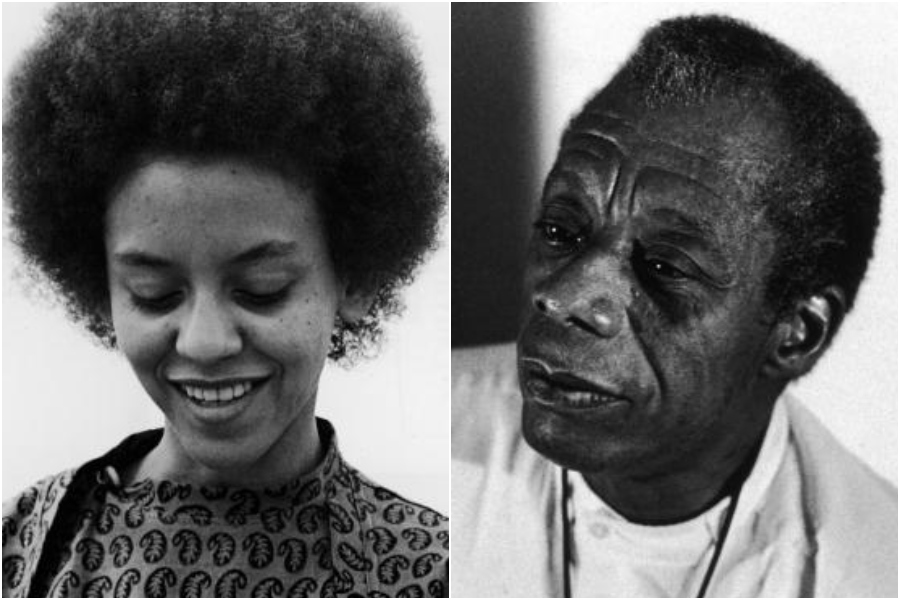
Source: Pictorial Parade/Getty; Ruby Washington/Getty / Getty
Throwback Thought aims to create commentaries and spark dialogues on past pop cultural moments as they relate to things happening in today’s society. In this week’s edition, Madame Noire explores an excerpt from a conversation between Nikki Giovanni (poet, activist, and teacher) and James Baldwin (novelist, essayist, and cultural critic) from 1971, where the two prolific writers discuss in passing a phenomenon we now refer to as “copaganda.”
Giovanni and Baldwin’s intimate discussion was originally taped in London in 1971 and aired that same year as a two-part special for a TV show called Soul! — “a pioneering variety television program dedicated to African American art (dance, music, and literature) in the late 1960s and early 1970s” as described by MoCADA. Later being printed as a book titled A Dialogue in 1974, the conversation between the two spanned everything from their generational differences in understandings and approaches to race, issues surrounding Black love as it relates to gender — and of course — works of Black literature. Poignantly amidst their conversation, Giovanni happened to mention a campaign happening in New York at that time which aimed to invoke sympathy for the state’s police force.
GIOVANNI: You know in New York there’s a big campaign going on to humanize the policemen. They have posters, billboards upstate and they have a picture of a big cop bending over this little blond girl —
BALDWIN: Uh huh.
GIOVANNI: and the sign says: “And some people call him pig.”
BALDWlN: Uh huh.
GIOVANNI: And I wanted to rent a billboard, I told a friend of mine, and show this big cop and this fourteen-year-old black kid with thirty bullets in him, and say: “And some people call him peacemaker.”
Although being discussed by the two back then, the excerpt above still holds relevance as a part of our contemporary dialogue. Last summer, as the world mourned the deaths of George Floyd and Breonna Taylor (amongst others) — in addition to seeing the intensity and rawness of the Black Lives Matter protesters clashing with militant police almost every day on their TVs, another “campaign to humanize the police” in cities across the country inevitably rose. As we saw constant coverage of the protests being escalated due to excessive police force — we also simultaneously saw an influx of videos where the police were kneeling with protestors, hugging them, and singing about how “good cops” still exist.
Now being known as “copaganda,” the phrase defines the phenomenon of policemen very often being depicted as heroes within our pop culture and/or — as Giovanni highlighted — the push to frame policemen as the “good guys” on both systematic and societal levels. While encouraging citizens to trust their police departments and neighborhood cops isn’t inherently bad, police propaganda becomes a serious problem when it’s promoted in ways that diminish and/or discount the historical and present realities of police behavior. As we know, those harsh realities are even more so an issue when it comes to the dynamics at play between them and communities of color.
Grappling with the topic Giovanni had brought up in her conversation with Baldwin almost 50 years ago, issues surrounding police propaganda have finally started to become a part of our mainstream conversations. Within June and July of last year — amidst the protests — a countless number of think pieces and commentaries on the topic swirled. Refinery29 referred to copaganda as “one-dimensional displays [that] actually do harm by presenting cops as being solely friends and allies to the public-at-large rather than offering a truthful depiction of the deeply violent and racist nature of police work in America.” Relatedly in a piece from USA Today, the publication highlighted how inauthentic police depictions in pop culture through copaganda are. They noted, “The cops always find the guilty party in a satisfying final act. There are few instances of police brutality or misconduct. The innocent are rarely convicted. Anyone who gets in the way of policing – an uncooperative citizen, an internal affairs investigator or even other law enforcement agencies – is the enemy. If a cop does anything wrong, it’s always for the greater good.”
Here at Madame Noire, writer, activist and documentarian dream hampton spoke with us about how copaganda has become ingrained into our everyday lives — and why the phrase “not all cops” just doesn’t hold up. On the latter she said:
We deeply connect to these characters on television because they are the most developed character on television. And furthermore, when I see Van Jones and them on tv trying to have conversations about reform or police misconduct or violence, I see them cede a non-fact. They say ‘Well, we all know that police work is dangerous and that they’re risking their lives.’
That’s not true.
They’re not one of the ten most dangerous jobs in the country. If you just take the NYPD, taxi drivers have a more fatal job. Window washers have a more fatal job. Garbage men have a more fatal job. I’m talking about literal data.
So we have these debates about police misconduct or police violence — I call it terror — and it’s based on a lie.
Statements like “Not all cops are bad” and the copangada promoted in our pop culture dishonestly frame the realities of what cop interactions are really like for many Americans — and that is the essence of what Giovanni touched on in her conversation with Baldwin. Although we’re unfortunately still dealing with the same thing over half a century later, in her extension of the conversation with us, hampton emphasized the phenomenon as one that has become so prominent in our society that it has the ability to cloud very important conversations being had surrounding the often fatal consequences of police violence in this country — and that is the real problem.









